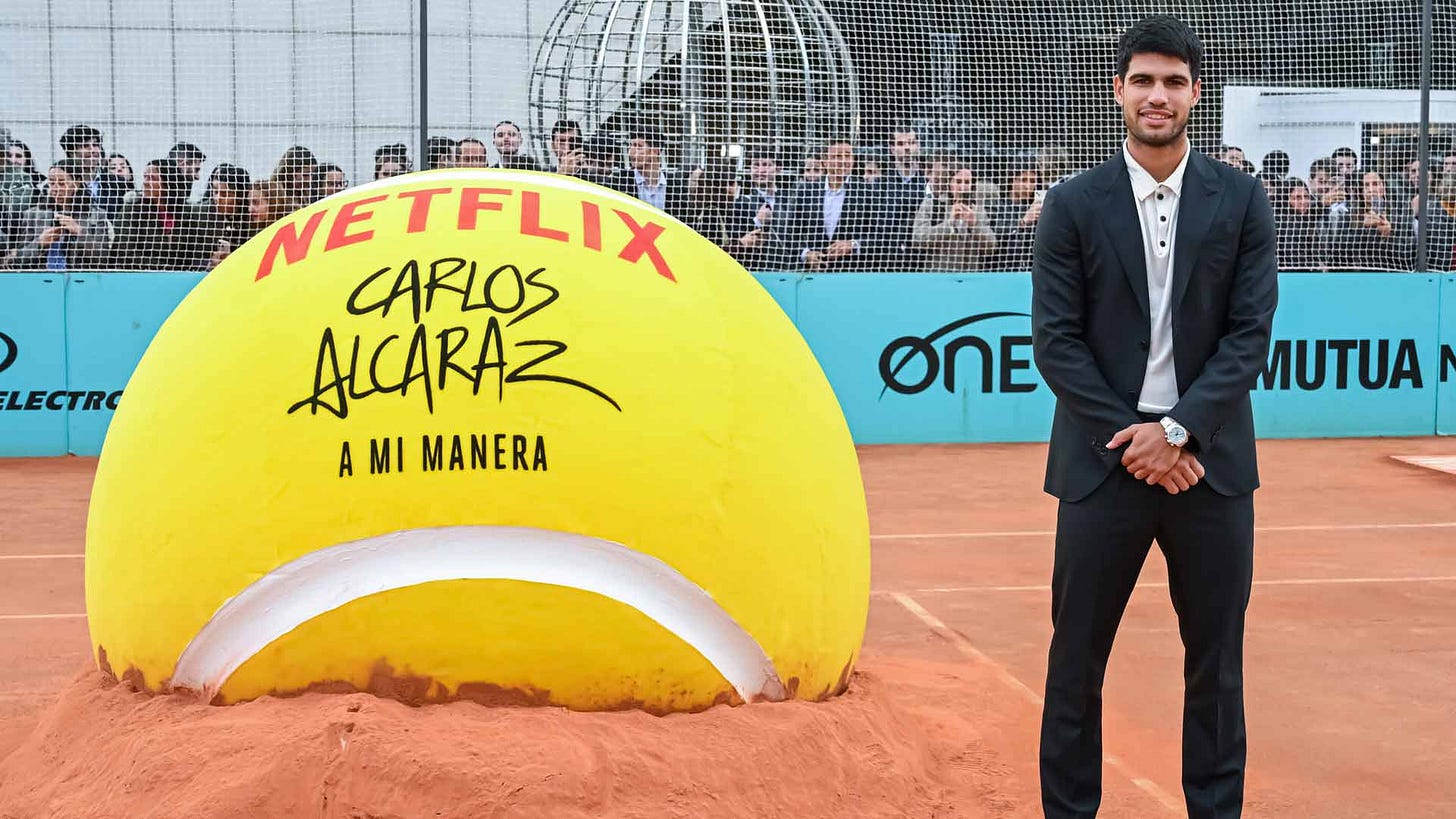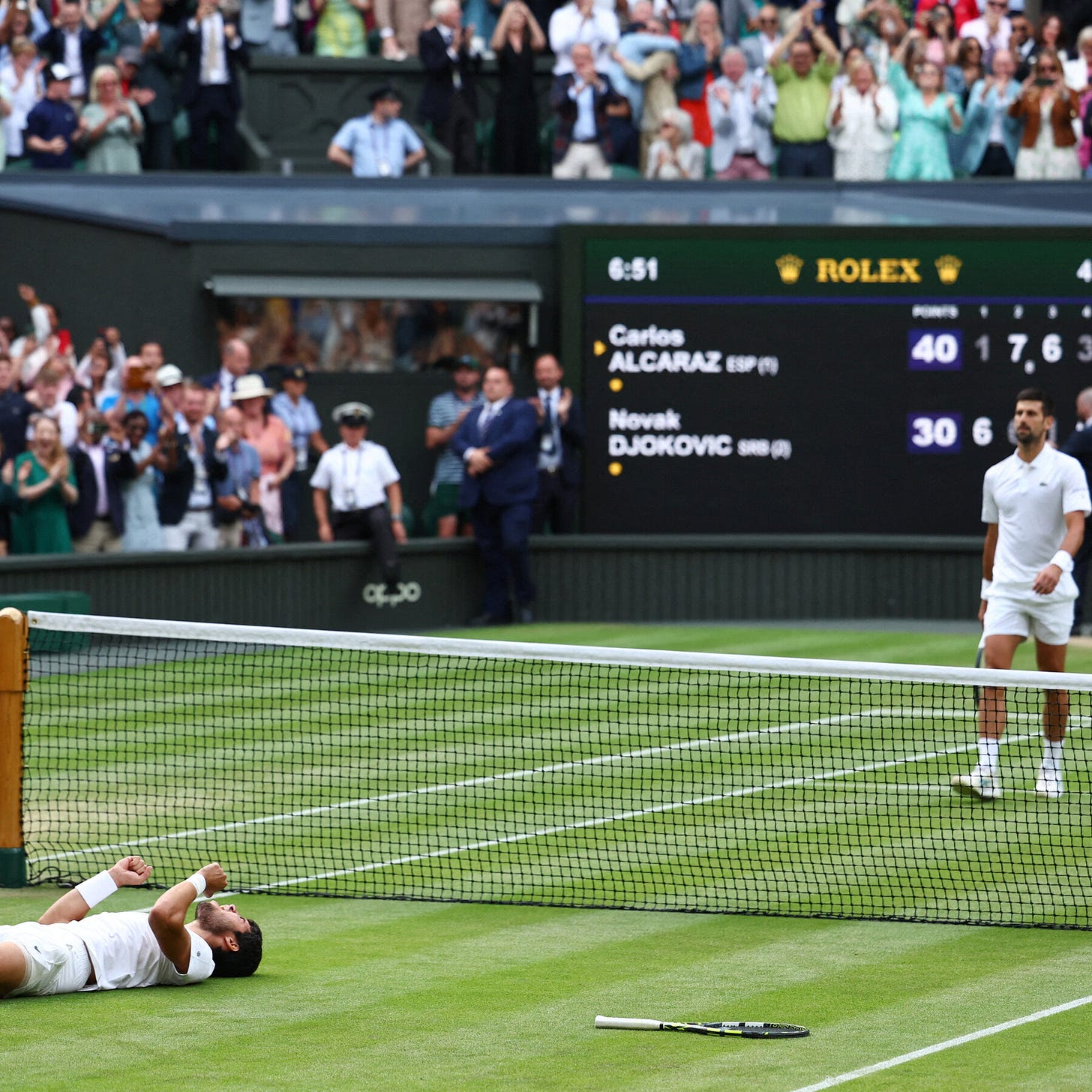The Curious Case of Carlitos
What if it doesn't work out?
As I finished watching what’s probably the first tennis documentary about a player who’s not only still active but hasn’t even hit his peak yet, a sudden thought struck me: we’re witnessing the rise of the first Netflix tennis star ever.
Think about that for a second.
For a sport as traditionally niche and elitist as tennis, Alcaraz has actually managed to make it mainstream — a couple of generations late compared to football and basketball, sure — but we’re finally here.
If this is such a big deal for the sport, can you imagine how the person at the center of it must feel?
Now, add to that the fact that he’s only 22 years old, from a country where the shoes he’s expected to fill are so massive that, fairly or unfairly, it’ll always be a battle he’s destined to lose. Feeling the pressure yet?
Welcome to the curious case of Carlitos Alcaraz.

The best and worst thing that can happen to an all-time great talent, in my opinion, is to have a Mount Rushmore-level athlete from their nation already sitting on the throne.
On one hand, they get a blueprint — proof that those impossible heights are, in fact, achievable.
On the other hand? In the age of social media, the cons might just outweigh the pros.
Take Messi and LeBron, for example. To me, they’re not only the two greatest team-sport athletes of this century, but the greatest ever in their respective sports. And yet, no matter what they do — no matter how many untouchable heights they reach — they are forever linked to the legends who inspired them to even pick their jersey numbers: Maradona and Jordan.
Is that fair?
Did they sign up for those comparisons when they were just unproven kids with hype and a dream? Of course not.
But as long as they play — even though they’ve arguably surpassed their idols — they will be compared, forever.
Carlos is the first such case in tennis, at an all time great level.
None of the three giants he idolized had to carry this burden — or privilege. They didn’t have cameras filming their every move. They didn’t have users on Twitter calling them washed has-beens every time they missed a forehand.
Alcaraz is the first tennis superstar to come of age in the full-blown social media era, with the added weight of history pressing down on his shoulders: 22 Grand Slams worth of shoes to fill in his own house, the expectation to never show vulnerability, and now... the court of public opinion dissecting his personal life like it’s part of the match stats.
Three days after the documentary dropped, the verdict from fans — and even some peers — is already in:
"He parties too much."
"He’s not serious enough."
"How arrogant to ignore his coach’s advice."
"How cocky to star in a documentary about himself before he’s even 'earned it.'"
Are some of these criticisms warranted? Sure. No one’s pretending he’s perfect.
But has he become an easy target simply because heavy is the head that wears the crown? Undoubtedly.
Carlos isn’t the first 20-year-old millionaire athlete putting up 99th-percentile results who also happens to enjoy himself — and he won’t be the last. What’s different is that he’s the first whose every move is monitored under a global microscope.
No one cared — or even knew — if Nadal was out partying at 3 a.m. in Mallorca after winning big tournaments.
"Oh, but he was too disciplined for that."
Sure, Nadal was more structured with his training. But was he some emotionless workaholic who never left his uncle’s tennis club? Lol.
Nadal also didn’t have, say, Àlex Corretja questioning his habits and work ethic to third-party reporters — not even directly to him. If your own people can’t support you, why would you expect outsiders to?
I posted a review of the documentary on Twitter — what I liked, what I didn’t — but for me, the biggest mistake was how openly it portrayed a coach who doesn’t seem to fully believe his player can achieve his dreams unless he completely overhauls his life. The constant repetition of "GOAT table or bust" by the player, mixed with the passive-aggressive doubt from the team, gets exhausting.
And honestly, it shouldn’t have been the core narrative of a documentary about someone who is, in theory, just entering his best years on tour.
Do I think Alcaraz can sit at the table he aspires to? It depends on how many seats there are.
If it’s a round banquet table holding twelve, then sure, he absolutely can.
If it’s a tight dining table for four, I have my trepidations.
But either way, my answer is based on his technical and tactical tennis ability — not on how many Coronas he chugs after becoming the youngest player ever to complete a surface slam.
People seem to forget that part.
Even factoring in the recent ups and downs, the injuries, and technical tweaks, Carlos — by any objective measure — has built a top-5 resume of all time for players under the age of 22.
When he’s already achieved this much doing things his own way, off the court and on it, what exactly is the problem? Is the supposed trade-off — sacrificing joy, personality, spontaneity — really worth it?
Tennis was fading. The next generation felt underwhelming. And then, out of nowhere, we were gifted Carlos Alcaraz. Sure, Swiatek, Sinner, and even Sabalenka have carved out their spaces at the top.
But Carlos was different.
We handed him the pressure of being the face of tennis almost two years ago. It’s only fair now that we give him the space to breathe — and let him do things, as the documentary fittingly suggests, "His way."
After all, greatness has never followed a blueprint. It has always — always — carved its path.





